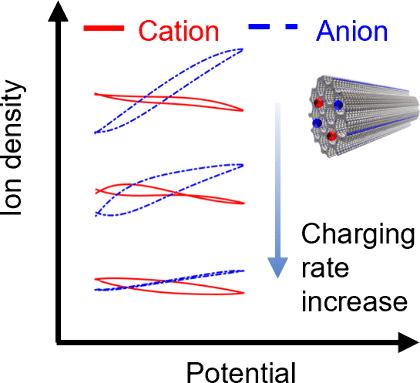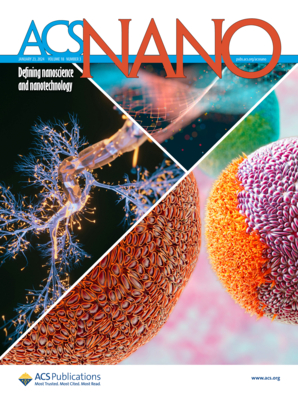充电速率对导电MOF电极离子吸附和解吸的过筛驱动调制
IF 15.8
1区 材料科学
Q1 CHEMISTRY, MULTIDISCIPLINARY
引用次数: 0
摘要
阐明充电机理对高性能超级电容器的发展具有内在的关键作用;然而,深入了解这种机制在不同收费费率下的变化仍然具有挑战性。在这项研究中,我们结合电化学石英晶体微平衡和恒电位分子动力学模拟,研究了导电金属-有机框架(c-MOF)电极在离子液体中的充电机理。实验和模拟结果都表明,离子吸附和解吸模式从低充电速率下的阴离子主导转变为高充电速率下的离子交换主导,显著降低了阴离子对电容的贡献。孔内离子的动态结构表明,这种转变源于过筛强度的变化,这导致c-MOF孔的中心和表面区域在极化下的离子响应不同。这项工作为优化超级电容器的设计奠定了基础,特别是在高充电速率下。本文章由计算机程序翻译,如有差异,请以英文原文为准。

Overscreening-Driven Modulation of Ion Adsorption and Desorption in Conductive MOF Electrodes by Charging Rates
Elucidating the charging mechanism plays an intrinsic and critical role in the development of high-performance supercapacitors; however, a deep understanding of how this mechanism varies under different charging rates remains challenging. In this study, we investigate the charging mechanism of conductive metal–organic framework (c-MOF) electrodes in ionic liquids, combining electrochemical quartz crystal microbalance and constant-potential molecular dynamics simulations. Both experimental and modeling results reveal a transition of the ion adsorption and desorption modes from anion dominance at low charging rates to ion-exchange governance at high charging rates, significantly reducing the contribution of anions to the capacitance. The dynamic structures of in-pore ions suggest that this transition stems from variations in the overscreening strength, which leads to different ion responses between the central and surface regions of c-MOF pores under polarization. This work could lay the foundation for optimizing supercapacitor design, especially under high charging rates.
求助全文
通过发布文献求助,成功后即可免费获取论文全文。
去求助
来源期刊

ACS Nano
工程技术-材料科学:综合
CiteScore
26.00
自引率
4.10%
发文量
1627
审稿时长
1.7 months
期刊介绍:
ACS Nano, published monthly, serves as an international forum for comprehensive articles on nanoscience and nanotechnology research at the intersections of chemistry, biology, materials science, physics, and engineering. The journal fosters communication among scientists in these communities, facilitating collaboration, new research opportunities, and advancements through discoveries. ACS Nano covers synthesis, assembly, characterization, theory, and simulation of nanostructures, nanobiotechnology, nanofabrication, methods and tools for nanoscience and nanotechnology, and self- and directed-assembly. Alongside original research articles, it offers thorough reviews, perspectives on cutting-edge research, and discussions envisioning the future of nanoscience and nanotechnology.
 求助内容:
求助内容: 应助结果提醒方式:
应助结果提醒方式:


